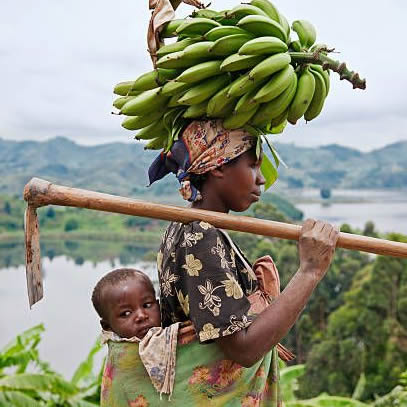Let’s Not Forget The Poor African Woman
- Home
- Let’s Not Forget The Poor African Woman

Let’s Not Forget The Poor African Woman
 An imagery is always painted in Africa about a proverbial woman who is returning from the farm with tonnes of load on her head and struggling to order her weak legs through the thorns and thistles of the tropical African forest.
An imagery is always painted in Africa about a proverbial woman who is returning from the farm with tonnes of load on her head and struggling to order her weak legs through the thorns and thistles of the tropical African forest.
An infant struggles at her back in a strap, having been tied there as part of the load she has to carry home. And to make the picture bizarre, the husband of this poor woman walks behind with just his machete in hand and smoking graciously from his pipe.
The imagery, which has been physically actualized by brush and colour, has an unending story which goes on to say that when they finally get home, the man drops his machete and relaxes in his ‘lazy chair’ whilst the woman drops her loads, fetches water for the husband to drink and then dashes off to the kitchen to begin a long session of cooking for the entire family.
The man is then served his meal, and after bathing with the water served at the bath house, he walks out of the house to join fellow men, who had enjoyed similar treats from their wives, to cool off the day and play, leaving the poor woman to take care of the tidying of the house and taking care of the children.
At night, when the man finally returns and everybody is asleep, he wakes this poor wife up and demands that she performs her marital duty to him as her husband. If she denies, obviously because she is tired, it could lead to serious controversy that could send her packing the next day, and so out of desire to protect her marriage, she yields and the man does whatever he wants to do.
This picture of the rural African woman could be aligned to that of the poor African urban woman, mostly a single mother, who hawks on the streets of a city with a baby tied to her back and stands in the heat of the African sun till dusk just to provide a decent meal for her children. And at night, she would surely retire to a ‘Kiosk Estate’ community where women in similar situations live in very deplorable make-shift structures with part-time or permanent spouses.
This has always been the predicament of the unsung African woman, but these perhaps are the least of her troubles. In the event of a pregnancy, another child on the row. She has to carry the baby for nine months, which she would do graciously anyway, and then through contractions and tears, a new human being pops out to the utmost joy and happiness of the man who would savour the product of his” masculinity”.
For many years, this child, like the others before or after him, would be in the total care and nurture of the mother even if the man provides for the child’s up keep. It means that should the child turn up with a bad attitude, society would surely blame the woman for being the one who failed to raise him after the values espoused by society. Should the child turn out successfully in life, credit must certainly go to the father under whose guidance the good nature of the child was developed.
Perhaps, the real troubles of the African woman begin when her children come of age. This is because, at this age, she has aged and has metamorphosed into a candidate for ridicule and rejection.
His successful male children would look on whilst their spouses reject this same woman through whose sweat and toil they grew into responsible adults. All of a sudden, this aging mother-in-law becomes a nuisance who has to be gotten rid of, and so her presence in her sons’ homes is looked on as a source of worry to her daughters-in-law, fellow women who should have appreciated womanhood. The situation even gets worse when this mother is completely forgotten by her loving sons not because the sons are that wicked, but because some ” caring” wife of the son has succeeded in taking away the love a son once had for a mother.
The situation of the African woman gets worst when her children decide to be consumed by the wave of false religious doctrines that are blowing across Africa. Whilst the wives of the successful sons of the woman see her as a nuisance in their homes, those of the unsuccessful sons would lure their husbands into accepting the prophet’s admonition that this poor old lady was the source of all their woes in life, and that would spark an attitude of hatred not only from the couples but their children at a woman who is drained and empty because she gave her all to keep the cycle of life intact.
It is therefore not surprising that the Witches Camp, situated in Northern Ghana, has mostly old women as campers. These are the people society has abandoned and sent there to suffer and die just to satisfy somebody’s unfounded perception that they are evil and strange human eaters.
As we celebrate International Day of Women (IDW), let us not only focus on the educated middle class woman who lives gorgeously in the cities; let us not only focus on the achievements of great women, past and present; let us also cast our minds back and put our ears down to hear the silent cry of women who are marginalized and brutalized daily by society because of their vulnerability. These women could live better lives and live longer if we stop the discrimination against them and remember the great roles they have played in our lives.
Womanhood is a benevolent force that could be used by society to better the lives of mankind. The kind heartedness of the woman coupled with her ability to take pain for their children and the family is a quality we should harness to the benefit of society instead of maltreating them simply because they are vulnerable in society, especially at old age.
We owe it a duty to mankind and the well-being of society to recognize the silent but important role played by the poor African woman in raising the great men and women who have shaped the destiny of our planet.
By Alexander Nyarko Yeboah
Source: GNA
- Share
Classic Ghana
Classic Ghana brings you into a fun world of arts, entertainment, fashion, beauty, photography, culture and all things in between. Let’s explore these together!







